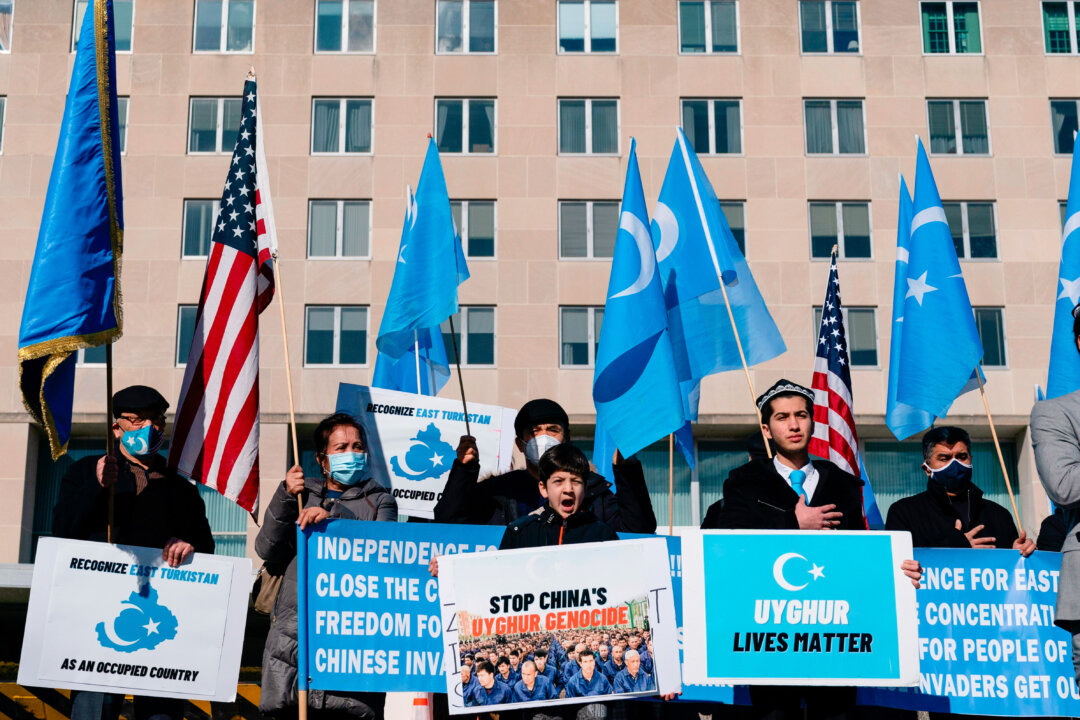‘With every additional day of Uyghur incarceration, ethnic incapacitation progressively becomes more of a reality,’ according to the report.
Communist China’s mass imprisonment of Uyghurs will have a severe effect on future generations of the ethnic group, according to a recent report from Yale University.
“The systematic persecution of China’s Uyghur population is hardly a secret, but we are always learning more about the depths and extent of it,” said David Simon, director of Yale’s Genocide Studies Program, which released the report on Aug. 14. “This report shows the extent to which a policy of mass incarceration has been used not only to silence opponents of the regime but also to threaten the very existence of the Uyghur identity.”
The report, titled “Uyghur Race as the Enemy: China’s Legalized Authoritarian Oppression and Mass Imprisonment,” was co-authored by lead researcher Rayhan Asat, a human rights lawyer of Uyghur heritage. Asat has been campaigning for her brother Ekpar Asat, who disappeared in 2016 and was sentenced to 15 years in prison in 2020 on charges of “inciting ethnic hatred and ethnic discrimination.”
The Chinese Communist Party (CCP) has locked up more than 1 million Uyghurs and other mostly Muslim minorities in internment camps in its far-western region of Xinjiang under the pretext of “combating extremism.” Detainees at the camps are subjected to forced labor, torture, political indoctrination, forced abortion, and other inhuman treatments. Both the Biden and Trump administrations have determined that the regime’s repressive policies in Xinjiang are a form of genocide.
The report estimates that if Beijing continues its current repressive policies in Xinjiang, Uyghurs could suffer a combined total of 4.4 million years of imprisonment.
“Forcibly displacing hundreds of thousands of Uyghur individuals from the communities of the Uyghur people and stripping from them more than 4.4 million cumulative years will grossly undermine the integrity of their people to continue surviving as a group,” the report reads.
To come up with their estimate, researchers looked over data available from the Xinjiiang Victims Database, an online nonprofit initiative dedicated to documenting the disappearance and incarceration of Uyghurs. Of the 31,114 cases that listed a known prison term, researchers determined that the average sentence was 8.8 years.
Researchers then multiplied 8.8 years with about 500,000 Uyghurs that the Xinjiang High People’s Procturate stated that it prosecuted from 2017 to 2021, which yielded the estimate of 4.4 million years.
The report emphasizes that the database “is not comprehensive” and that the “actual numbers are far more significant.”
“Almost 90 [percent] of criminal records in Xinjiang are not public, even though legal records in other Chinese regions are, meaning that records of hundreds of thousands of Uyghurs who are known to be imprisoned were unavailable for the context of this particular analysis,” the report reads.
The researchers said Uyghurs face what they call “ethnic incapacitation,” meaning that individual Uyghurs may survive, but the “community will collapse, disperse, and lose all substance without a majority of its members to maintain it.”
“With every additional day of Uyghur incarceration, ethnic incapacitation progressively becomes more of a reality,“ the researchers wrote. ”If the Uyghur population continues to be barred from maintaining their communities, it is only a matter of time before full ethnic incapacitation is realized and the damage is irreversible.”
The report offers some recommendations to stop the CCP’s persecution of Uyghurs, including having member states of the United Nations “activate all accountability mechanisms to compel China.” It also calls on the U.N. Human Rights Council and the Office of the U.N. High Commissioner for Human Rights to “take a collective stance” against the persecution.
“We hope this report not only contributes to the ongoing documentation of crimes against humanity and genocide but serves a wake-up call to the countries in the global south which for nearly a decade has remained bystanders in the face of China’s economic influence,” Rayhan Asat said in a statement.

